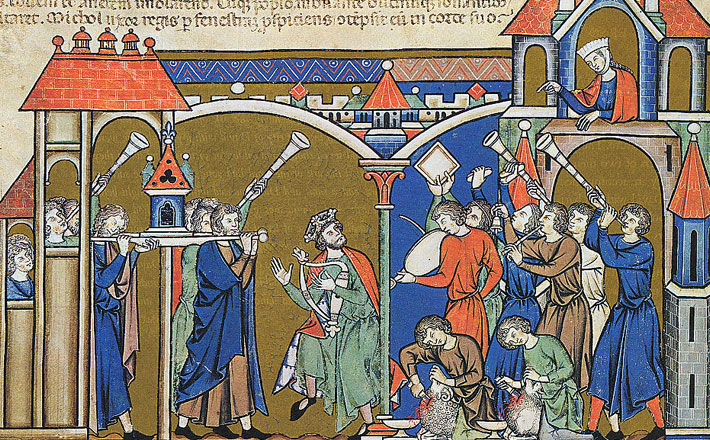Commentary on Ephesians 2:1-10
You’ve been saved for the purpose of good works.
There, I said it. I feel much better, thank you. Actually, I did not say it; “Paul” did.1 And Jesus seems to have said something along these lines also (Matthew 5:16 — understood within the entire narrative context of Matthew). Martin Luther argues this in “The Freedom of a Christian” (who, let’s face it, functionally stands in as Jesus for some people). While Ephesians 2:1-10 sings the “saved by grace” tune pretty loudly, there are a couple of “in order that” clauses that bring out the “good works” side of the equation also.
Now, I know many will say, “Of course. First is the divine initiative and the good works flow out of God’s work in us.” Even the Lutheran liturgy expresses this in our confession liturgy: “forgive us, renew us, and lead us, so that we may delight in your will and walk in your ways … ” Indeed. Yet, perhaps still more can be said. The phrase from the Lutheran liturgy highlights something important for understanding the good works for which we’ve been saved: “walking.” It’s a word we find in Ephesians 2:1-10 — the Greek verb peripatew. It’s often overlooked, but it shows up both at the beginning and at the end of this pericope (vss. 1 & 10). One could make the case that this idea — peripatew — frames what Paul says here.
Paul is getting at something other than just “doing” good works; he’s writing about “walking.” Sometimes, I’m afraid, it seems we’re inclined to read this passage through the lens of what I have termed MPS: “Moral Perfection Syndrome.” God demands moral perfection. We can’t do enough good stuff, we sin, and because we’re not “perfect” we are in big divine trouble. Jesus needs to save us and forgive us because of what we can’t do. MPS, I think, negatively affects how we read passages like Ephesians 2:1-10.
The verb peripatew, used metaphorically, as many of you probably know, pertains to the orientation of one’s life. Many people today peripatew in the stream of popular Americana, of People magazine, of American Idol and The Voice, of Disney, of sports culture, the “American Dream,” and of a general cultural mentality that shamelessly promotes the elevation of the self above all else. To reduce the idea of peripatew to the steps one takes and the choices one makes risks misunderstanding the profound claims Paul makes here. The common translation “following” (NRSV; NIV; ESV) does not quite encapsulate the thickness of this term. We’re not saved just from our bad individual choices or what we “follow.” God delivers us from an entire mode of existence — indeed transfers us from one sphere to another — not just from the inability to make enough of the “right” choices.
Paul reminds his audience that they were once peripatew-ing according to “the course of this world” (NRSV; ESV); “the ways of this world” (NIV). These translations again suffer from MPS by thinking in terms of steps, choices, ways, etc. The word translated “ways” or “course” is aeon. Scholars debate whether it should be best understood as a force, not unlike “capital-S Sin” in Paul’s letters, or in a temporal sense “the age of this world.” Since the early 2nd century B.C.E., people personified Aeon, and it referred to a deity of sorts. Something to which certainly some people could be captive from Paul’s perspective. For some interpreters it is more probable that Paul uses the word temporally. Either way, the emphasis lies on something more substantial than “ways” or “course.”
The idea might be equivalent to the house in which we live and make our dwelling. One sets up a house according to everyday living habits, preferences, and things we take for granted. And the set up reinforces these everyday habits. We put the toothpaste in a certain drawer; we place pots and pans in certain places because of how and why we use them. This is more than just “ways” or “course” of the house. It’s an entire environment that makes for certain ways of going about the details.
“Whose house?” This is an important question. The following clauses, “the ruler of the kingdom of the air, the spirit who is now at work in those who are disobedient” (NIV), can further define the aeon as a cosmic or divine force (“the one ruling the kingdom of the air … ”) or it can itemize the “ruler” as a component of this aeon understood temporally. The point is that the house in which the old humanity made its dwelling was operated by an outside party. And it’s not Jesus Christ.
It is only after defining the meta-structures operating in this world that Paul then comments on the individual transgressions and missteps in following the flesh (which Paul does not say is inherently evil or sinful). Our individual actions are products of the house and its environment, under the operations of its ruler.
When we operated according to the transgressions and sins — the mode of life in the old house of the old aeon, Paul says to his audience, “you were dead.” In contrast to this, Paul says we are “made alive” in Christ, and “created” in Christ. Our transfer is a genuinely new thing; we are created new. We’re not just to feel better about our relationship with God while still dwelling in the old house.
This transfer from houses and their overlords, according to verses 5 and 8, is an act of “grace.” “Grace” in Paul’s world was not “pardon” but an act of benevolence that usually resulted in a better situation for the recipient. As the theme song from the late 70s show, The Jefferson’s, says: “we’re movin’ on up.” Or, rather, we’ve been moved on up. And it’s in that transfer that we’re saved — saved from the self-imposed disaster and ruin that inevitably results from life dwelling in the house of the old aeon.
As Paul goes on in Ephesians, he will stress the importance of reconciliation. Not just our reconciliation with God, but with each other. This new house under the Lordship of Jesus has no place for divided humanity. The “other” is no longer the “other” but sister/brother. We have been saved and remade in Christ for this, for the “good works” that are simply part of the mode of life in the new house under the benevolent and gracious house Lord. We’re not saved by good works, but saved so that the good works that reconcile and are evidence of reconciliation would be our mode of life. It’s not for us; it’s for the reconciliation of the world (2 Corinthians 5:18-20).
Notes:
1 For an entire generation of scholarship, Ephesians was not considered authentically Pauline. This perspective remains, but not as solidly as it once did. Many of the presuppositions behind seeing Ephesians as pseudonymous have been questioned in recent years, and what “Pauline” might mean is considerably more complex than just whether it was written pseudonymously or not. I retain “Paul” in quotes to recognize the uncertainty, but without conceding to pseudonymous authorship, at least as it has been understood.


March 15, 2015